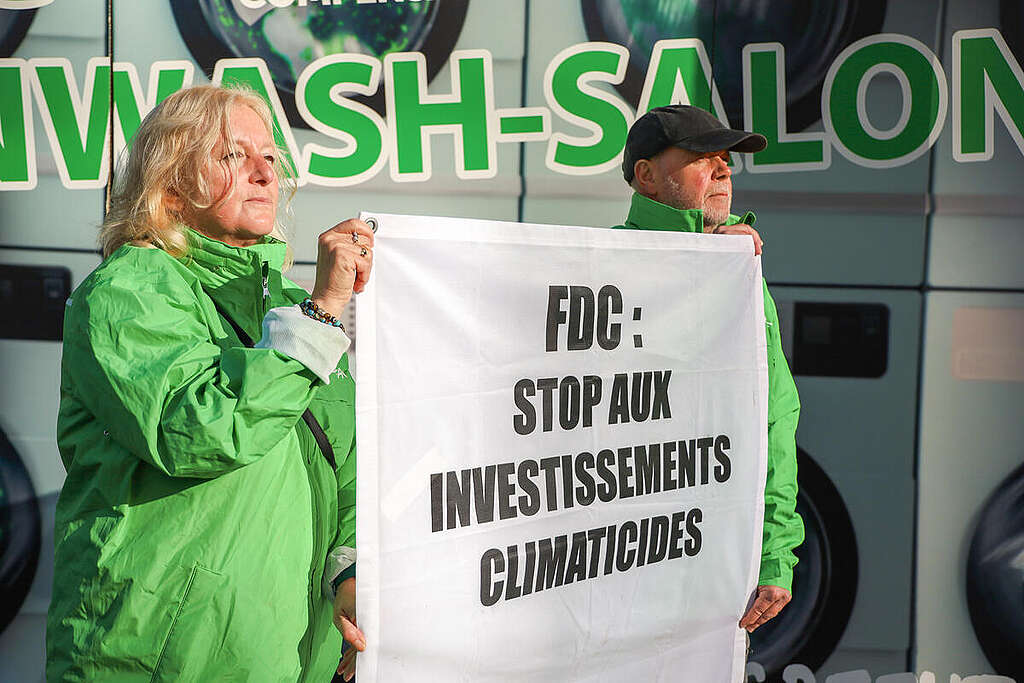We live in a world where people’s movements for a healthy environment, with clean air to breathe and fresh water to drink, are vital and unstoppable. Sadly, fossil fuel companies are using all their might to continue extracting and polluting – harming communities, nature and the climate, all for the short-term financial gains of a few.
But, as crises collide, calls for governments to hold corporations to account are growing, together with expectations that businesses must avoid harming people and the environment – and instead engage meaningfully with workers, communities and civil society to serve the common good. That includes pension funds!
Why do pension funds matter in the fight for climate justice?
With more than US$ 46 trillion in assets worldwide, pension funds are among the largest institutional investors in fossil fuels. As Climate Safe Pensions points out, nearly 30% of fossil fuel industry shares are held by pension funds. By financing fossil fuel companies, they enable the industry to continue to produce and burn more coal, oil and gas, driving up greenhouse gas emissions at the very time when the world needs to be doing the exact opposite – urgently and rapidly decreasing climate-wrecking emissions.
Pension funds are also among the major backers of the corporate scramble for fossil fuel expansion across the African continent. This is why they are a target for movements such as the vibrant Stop EACOP campaign that is pressuring banks and investors worldwide to quit financing TotalEnergies and the devastating East Africa Crude Oil Pipeline (EACOP).
At the very least, pension funds should do no harm to current and future generations. That means ending finance to fossil fuel companies and projects that are causing human rights violations and environmental pollution. Just imagine if this financial power was invested in climate solutions and sustainable energy for all instead.
State funds could be part of the solution instead of funding the problem
State-owned companies such as sovereign pension funds have an even bigger responsibility to act in line with international standards and they should be among the first movers in sustainable finance. By adopting strategies that protect people’s right to a healthy, clean and sustainable environment, they could lead the transition towards a more responsible financial sector and contribute to global efforts to divest from fossil fuels.
Public pressure has led to some important steps in the right direction. For example, in 2015, Norway pulled the Government Pension Fund Global (GPFG) out of coal. In 2019, GPFG announced it would dump investments in firms exploring for oil and gas. These divestment decisions have led to the exclusion of 88 climate-damaging companies from GPFG’s investment universe. In 2020, the Dutch pension fund for civil servants and teachers (ABP) announced it would end fossil fuel investments and sell its holdings in fossil fuel companies. By February 2024, the Dutch healthcare workers’ pension fund (PFZW) had sold off almost all of its holdings in fossil fuel companies. Among the corporations dropped by these two Dutch pension funds are high-polluting carbon majors like Shell, TotalEnergies and BP.
Unfortunately, today, there are still no rules at the international level obliging state-owned companies such as pension funds to invest responsibly and in line with international climate and human rights standards. It’s therefore difficult to hold them accountable for their negative impact on society and the environment.
Yet, there are opportunities for action using existing multilateral processes. The Organisation for Economic Co-operation and Development (OECD) Guidelines for Multinational Enterprises on Responsible Business Conduct offer a mechanism to challenge pension funds in front of an independent authority. Surprisingly, until now, this tool has only been used to question the practices of pension funds in four countries: Norway and the Netherlands (among the world’s largest), South Korea, and now in Luxembourg.
Luxembourg’s pension fund is the most recent to have its fossil fuel investments put under the OECD spotlight. The case brought by climate justice activists could help spell out the responsibility of pension funds to protect society and the environment not only in Luxembourg but worldwide.
Luxembourg’s pension fund is fueling the climate crisis
Recent research by Greenpeace Luxembourg shows that in 2022 the national pension fund, Fonds de Compensation (FDC), invested in 558 companies that have already been excluded by other institutional investors, including pension funds, because of their contribution to the climate crisis. Currently, the fund does not exclude any companies on climate grounds.
The social security contributions, paid by employees in Luxembourg’s private sector, are therefore invested in top carbon majors which are destroying their future.

Overall, the Luxembourg pension fund has invested in more than 1,200 companies that have been excluded by other investors because of their contribution to climate change or their involvement in environmental damage, human rights violations and controversial weapons such as cluster mines or nuclear weapons.
Since 2015, Greenpeace Luxembourg and its allies have consistently advocated for an ambitious and sustainable investment strategy for the pension fund aligned with international climate and human rights norms to guarantee the security and well-being of current and future pensioners. However, its recommendations have mostly remained unheard.
How can pension funds move towards more responsible conduct?
To revive the dialogue, Greenpeace Luxembourg has recently filed a complaint against FDC with the OECD National Contact Point (NCP) for Responsible Business Conduct. The NCP serves as a non-judicial grievance mechanism and provides a forum for discussion by facilitating mediation between the two parties.
The complaint alleges that the pension fund’s investment activities are in breach of the OECD Guidelines for Responsible Business Conduct which reflect governments’ expectations of businesses to act responsibly. These guidelines cover all key areas of business responsibility, including human rights, labour rights, environment, bribery, consumer interests, as well as information disclosure, science and technology, competition, and taxation.
As the national pension fund, made up of citizens’ financial contributions, Luxembourg’s FDC must act to live up to international climate and human rights norms.
Greenpeace Luxembourg demands that the pension fund respects the recommendations of the OECD’s guidelines within its policies, strategy and practices and makes investment choices that protect and safeguard our collective futures in the face of the growing climate crisis.
Luxembourg is the second largest investment fund centre in the world after the United States of America. If the NCP accepts the complaint against this fund, the process could help clarify the responsibility of pension funds to protect society and the environment, not only in Luxembourg but worldwide. Sign the Greenpeace Luxembourg petition and join the call for Luxembourg to become a sustainable finance centre.
Martina Holbach is a sustainable finance campaigner with Greenpeace Luxembourg.



